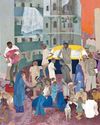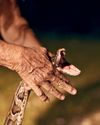Once a child left for dead, now an award-winning author, Manoranjan Byapari’s life is an astonishing survival saga

January 2018, Chennai. The stage is set for The Hindu Prize 2018 for non-fiction. Five outstanding books from over 500 entries have been shortlisted. Each of the authors is widely celebrated, barring one. So when the outlier’s work, Interrogating My Chandal Life— An Autobiography of a Dalit, is announced as the winner, it is a moment in Indian literary history. Receiving the award, author Manoranjan Byapari, now 69, normally tenaciously unsentimental, breaks down into his gamchha, which he wears around his neck as a symbol of his identity. Many in the audience, his wife Manju among them, struggle to fight back tears. “The joy is not mine alone, but that of all those who are hated and discriminated against. The respect I received here made me cry,” Byapari said later.
Byapari was born in 1950 into a family of fisherfolk in the lush Barisal district (in today’s Bangladesh). As namashudras, the lowest rung of the Dalit people, his family had little to lose, but the derangement of Partition took their home as well. The Byaparis were herded into a truck, along with at least 30 other families, and transported to refugee camps in the badlands of West Bengal. Memories of that terrifying journey—being bumped around in the vehicle in the searing heat, the air clouded with red dust from the tracks, a baby being born en route and an old man dying on the truck—were burnt into the brain of the 4-year-old.
This story is from the {{IssueName}} edition of {{MagazineName}}.
Start your 7-day Magzter GOLD free trial to access thousands of curated premium stories, and 9,000+ magazines and newspapers.
Already a subscriber ? Sign In
This story is from the {{IssueName}} edition of {{MagazineName}}.
Start your 7-day Magzter GOLD free trial to access thousands of curated premium stories, and 9,000+ magazines and newspapers.
Already a subscriber? Sign In

BOOKS
Books review

STUDIO - Off Lamington Road by Gieve Patel
Oil on Canvas, 54 x 88 in

NEWS FROM THE WORLD OF MEDICINE
FOODS THAT FIGHT DEMENTIA

TO HELL AND BACK
The Darvaza crater in Turkmenistan is known as the Gates of Hell. I stood on its edge - and lived to tell the tale

THE SNAKE CHARMERS
Invasive Burmese pythons are squeezing the life out of Florida's vast Everglades. An unlikely sisterhood is taking them on

Sisterhood to Last a Lifetime
These college pals teach a master class in how to maintain a friendship for 50-plus years

...TO DIE ON A HOCKEY RINK
ONE MINUTE I WAS PLAYING IN MY BEER LEAGUE, THE NEXT I WAS IN THE HOSPITAL

Just Sit Tight
Broken, battered and trapped in a ravine for days, I desperate driver wonders, \"Will anyone find me?\"

Allow Me to Mansplain...
If there's one thing we know, it's this: We're a nation of know-it-alls

THE BITTER TRUTH ABOUT SUGAR (AND SUGAR SUBSTITUTES!)
It's no secret that we have a serious addiction. Here's how to cut back on the sweet stuff, once and for all.